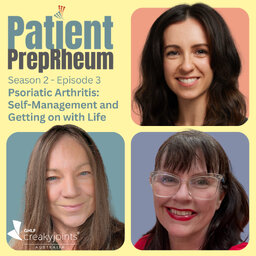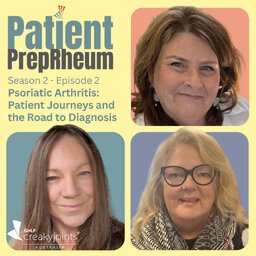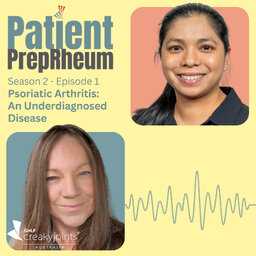Improving Patient/Doctor Communication
In our third episode, Naomi learns some top tips from fellow patient Sarah Clark about
having good communication with your doctor. Sarah tells of her rocky start with her initial diagnosis and early treatment until she found a specialist who really listened to her. Rheumatologist, Dr David Liew shares some wonderful insights and what helps him provide the best care possible to his patients.
Amongst other committee positions, he served on the Council of Australian Therapeutic Advisory Groups' Expert Advisory Group for the Guiding Principles for the Governance of Biologics and Their Biosimilars in Australian Hospitals and maintains an academic interest in adverse drug reaction surveillance.
Dr David Liew Profile
David Liew is a rheumatologist and clinical pharmacologist at Austin Health in Melbourne and also leads the Medicines Optimisation Service there. He is also the deputy editor of Rheumatology Republic and a co-host of the Australian Prescriber Podcast.
Amongst other committee positions, he served on the Council of Australian Therapeutic Advisory Groups' Expert Advisory Group for the Guiding Principles for the Governance of Biologics and Their Biosimilars in Australian Hospitals and maintains an academic interest in adverse drug reaction surveillance.
HOST: Naomi Creek
PATIENT: Sarah Clark
DOCTOR: Dr David Liew
My GP helped me find a Rheumatologist at the Rheumatology ward in Wellington.
I just did not connect at all with him. He didn’t really listen to me, his approach was cold and clinical.
Hi, I’m Naomi Creek and welcome to our 3rd Episode of Patient Prep Rheum.
In this episode, we are diving into the art of communication between Patients, Doctors and the rest of your healthcare team.
We know that many patients have a great line of communication with the members of their healthcare management team. However, we also know there are others out there who find themselves quite overwhelmed due to poor communication when they are just trying to find the best treatments for their often complex conditions.
We believe effective conversations between doctors and patients are extremely important as this not only fosters positive relationships, it also helps to greatly improve patient outcomes.
Sarah Clark, from New Zealand, lives with rheumatoid arthritis. She knows all too well the negative impact that poor communication between a patient and doctor can have on treatment.
My GP helped me find a Rheumatologist at the Rheumatology ward in Wellington.
I just did not connect at all with him. He didn’t really listen to me, his approach was cold and clinical.
My symptoms progressed rapidly, he did not really listen to that. Put me on anti-inflammatories, and said that that should deal with the symptoms which it did not.
I was flaring everywhere at this point, probably in every joint.
I just wasn’t getting anywhere with him.
It was by chance that Sarah”s rheumatologist was away on the day she had her appointment, so she saw a younger female rheumatologist, Rebecca, instead.
They connected instantly.
She was just really holistic in her approach and could clearly see from my lab results and how I presented in the clinic that my rheumatoid arthritis was 100% not under control.
She then started me on strong medications. In NZ it starts with anti-inflammatories, and then it works up tier by tier, so if you fail a medication you can go to the next tier of medications so quite swiftly she got me to try biologics and try humira and I was on methotrexate and still nothing was really helping so she got me on the infusions.
One of the major things for me is that she didn’t just sit there with their head in a piece of paper and a pen, they didn’t actually take notes while I was talking to them so they were engaging with me, making eye contact and it made me feel like I was having a conversation and they were responding to me.
Rheumatologist Dr. David Liew is aware that the relationship between a patient and their doctor can be complicated. He tries to figure out in the first appointment what they really need from him.
When people come to treatment, I’m looking at a few things -
What kinds of things that you need from me that you can only really get from me?
What are going to be the biggest impact things for you?
What are the things that you are interested in?
The biggest value that we add in this situation as rheumatologists, I don’t think it's a diagnosis, I don’t think it’s about knowing what medication comes next…
The value that we add is actually being a human person sitting in front of you that can have some, some damn level of empathy for you in this situation when you are going through this tough moment.
Dr David Liew appreciates the frustrations patients have, when they feel they can’t get all the answers they seek from their rheumatologist. But, as a medical professional, he’s sometimes limited in the information he can share.
I’m not an expert in every bit of medicine and in fact I don’t want to do a disservice.
Sometimes, giving a bit of knowledge is a dangerous thing. The times when things go badly it’s often from getting bad advice rather than no information at all. So, I know my limitations and I think most of my colleagues do too. That’s why we try not to go beyond what we know.
It’s frustrating to not be able to try and solve everything at once.
Just because we don’t deal with those problems outside of our area does not mean that we shouldn’t be aware of those problems - that’s crucial.
We know that with many rheumatological problems there are other issues that sit in other specialities that can come up and it’s up to us to be able to be conscious of all the things that are going on.
I think it’s important that a rheumatologist can really articulate some of the things to make sure that we’re getting the same message across different disciplines.
I’m very happy to have these conversations with my patients.
I’d rather have these conversations with you and kind of talk through things rather than just leave these things be because that's something you are clearly interested in if you're bringing it up.
Although rheumatologists may be willing to listen to other health issues, they may also have a team of allied health professionals in mind. The most important part is picking the right people to help each individual patient.
Patients aren't all the same. I’m not going to try and put everyone in one bucket and say this is my cookie-cutter approach for everyone.
Sometimes when we are prescriptive, we don’t allow for the situations our patients are in.
We don’t want people to get to the point where because they can’t achieve what’s been prescribed to them they stop all together.
Sometimes it works, sometimes it doesn’t.
That’s why we don’t just have one session…
And we just have to keep on trying things and circling back, seeing what works until something that works for you. Because that's ultimately what we're trying to do.
There’s also an active role that patients can play to help their healthcare professionals as well.
I think it works best when patients are engaged in their care and tracking these things but having said that...I can’t expect that all patients are going to do that.
I really like it when my patients bring along their blood tests and it’s brilliant but at the same time I don’t want to abandon my patients who don’t.
It’s important to remember that this is all about you. The support is there to help you, so don’t feel as though you are overburdening your doctor with questions. Instead, adopt a proactive approach to your healthcare and align yourself with support systems and find what works for you.
Sarah Clark is living proof that addressing what you need can have a major impact on your treatment. She shares some simple steps to help you reclaim your healthcare power.
As long as you keep the communication up and you can just continually talk about what’s happening for you, your symptoms, your side effects then you feel like you're working towards a common goal even if you're not there yet.
Making sure you have a list so that when you go in there and you might get into an emotional state you have a list to go back to so you don’t leave the appointment feeling like you haven't been heard about everything you needed to talk about.
Even taking a support person who can keep bringing the conversation back to your list or to what’s important to you and who also might also be able to give another perspective on your life outside of that appointment.
I know relationships with specialists and GPs are really important but relationships with other people who have autoimmune disease are equally as important. You can help each other navigate the system, you can discuss things that you’ve discussed in your appointments that maybe you didn ‘t completely understand. I just think it’s just a different level of support than a friend who hasn’t had that experience.
I think firstly, when dealing with anyone in the healthcare system is that you are only your own advocate so if you don’t stand up for yourself probably no one is going to.
So If the relationship isn’t working it’s going to be up to you to have to navigate that and actually be brave enough to say something.
Regardless of who your rheumatologist is, you can always improve your relationship, which will in turn improve your treatment outcomes, so it’s pivotal to address any and all healthcare concerns.
If you are unsatisfied with your doctor, you are 100% entitled to ask for your records to be transferred to a new one! It’s common practise and they won’t take it personally.
If you need more information about patient/doctor relationships or choosing your healthcare team, be sure to listen to our audio guide or visit the CreakyJoints Australia website at creakyjoints.org.au.
 Patient PrepRheum
Patient PrepRheum


